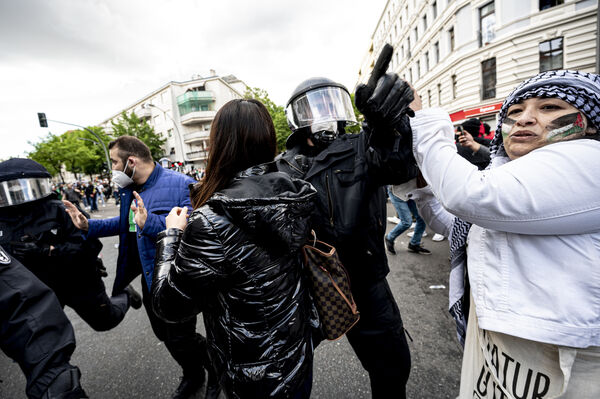Newsletter
Mar
9
2023
Dear Reader,
In recent years, German state officials and media outlets have cracked down on Palestinian speech and activism. In 2019, the German parliament passed a nonbinding resolution declaring the global Boycott, Divestment, Sanctions (BDS) movement antisemitic, and comparing it to Nazi boycotts of Jewish businesses. Early last year, a state-funded news outlet fired seven Arab and Muslim journalists for “antisemitism” that mostly amounted to criticism of Israel. And last May, Berlin banned several protests planned to mark Nakba Day, which commemorates the 1947–1949 expulsion of an estimated 750,000 Palestinians at the hands of Zionist militias. Jewish Currents has closely tracked these developments in a number of pieces—and on an episode of our podcast, On the Nose—examining how post-Holocaust memory culture in Germany has fueled censorship of discussions of Palestine to an extreme degree, even by American standards.
For this week’s installment of On the Nose—a follow-up to the earlier episode on Germany and the politics of Israel/Palestine—contributing editor Joshua Leifer talks to Germany-based Palestinian American journalist Hebh Jamal and Palestinian German lawyer Nadija Samour about Germany’s intensifying crackdown on Palestinian identity and activism. You can listen to the entire episode here, and check out a brief excerpt from the transcript below.
Best,
The Editors

Police confront Nakba Day protesters in Berlin on May 15th, 2021.
Fabian Sommer/picture-alliance/dpa/AP Images
Joshua Leifer: My next question is about how this has played out in German media. There was, for instance, the firing of the Palestinian journalists from Deutsche Welle, and there was also the firing of Nemi El-Hassan. Then there were also crackdowns on protests on Nakba Day. For people who have only seen the headlines, but don’t know the story behind all of this, what is going on in Germany? Why is this happening in the way that it’s happening? And also, why is this happening now?
Nadija Samour: In 2019, there was this infamous BDS motion in the German Bundestag, saying that the Boycott, Divestment, and Sanctions campaign is an antisemitic campaign, and that therefore, it should not be supported by public or state institutions. This is not a binding motion, and yet it has been dealt with as if this means that BDS is banned in Germany. It’s not legally banned, but it gives the impression [that it is], it [produces] this chilling effect. And I believe that this BDS motion was a crucial moment in systematizing the legal backlash against Palestinians and those who are in solidarity with Palestine in Germany. But it was not, of course, the first [instance of a crackdown].
In 2017, the International Holocaust Remembrance Alliance definition of antisemitism was adopted by Germany, and it has been handed down to German state institutions to be used as the one and only definition of antisemitism. This is also not binding, but [ . . . ] it’s portrayed as if it’s binding and it has created this one hegemonic understanding of the definition of antisemitism. This has also helped to systematize the backlash and repression against Palestinians. Ever since, we’ve seen all these cases of banning political activities. For example, [Palestinian activist] Rasmea Odeh was here three years ago; she was supposed to give a speech on the occasion of International Women’s Day, but she was banned from doing so. Then later on, there was another Palestinian journalist who was banned from speaking.
This is a very severe violation of fundamental rights. They have done this because of the atmosphere that has been created by the BDS motion, which has helped the state institutions to do this “legitimately.” Before the adoption of the IHRA definition, and before the BDS motion in the Bundestag, we were dealing mostly with a very fierce and defamatory media campaign, a slander campaign against Palestinian activists, and those who are in solidarity with Palestine, mainly by the outlets of the Axel Springer publishing house, one of the worst tabloids in Germany. They were adopting this discourse that state institutions and politicians could easily pick up, equating anti-Zionism with antisemitism, and also using Israel and Palestine as a projection screen to carry out debates on racism and law and order, national security, anti-terror [measures], restrictions on migration. Generally, [this is part of] what I would describe as Germany’s substitute nationalism in regards to Israel—placing themselves in the shoes of Israeli policymakers. It is a concentrated campaign in those media outlets that then served as the basis for these policies to be adopted.